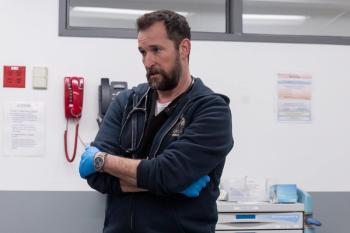
Doctors, nurses sound alarm about boarding crisis in hospital emergency rooms
Patients are routinely stuck in emergency departments for days, or longer, which is hurting patients and staff. A recent study also says it’s adding costs to hospitals.
Emergency physicians and nurses are pushing for lasting solutions for the problem of boarding patients in emergency departments for extended periods.
It’s been a persistent issue in hospitals for years, and leaders in emergency medicine are growing increasingly vocal about the need to address what they call the boarding crisis. Patients are being boarded in emergency departments for hours, days, and even weeks due to a lack of capacity at a hospital or the inability to transfer the patient to another facility.
The Agency for Healthcare Research and Quality held a summit on the issue in October, bringing emergency physicians and patients together to discuss the gravity of the problem.
Brendan Carr, MD, CEO of the Mount Sinai Health System, spoke at the
“We are intentionally marginalizing either these patients, or this specialty,” he said at the summit. “That’s what it feels like, right, because those are the patients right in front of you, and you’re watching them suffer and wait.”
Chris Dellinger, president of the Emergency Nurses Association, wrote about the problem in a message to the group’s members.
“You don’t need to have decades of experience in the emergency department to understand the seriousness of the ongoing boarding crisis,” Dellinger
'A systemic problem'
The boarding crisis is adding to the financial strain of hospitals, according to a
Maureen M. Canellas, MD, assistant professor of emergency medicine at the University of Massachusetts T.H. Chan School of Medicine and associate chief medical officer at the University of Massachusetts Medical Center, was the lead author of the study. She said she hoped the data on costs would add new urgency to coming up with remedies.
“Boarding is a systemic problem that requires collaborative solutions,” Canellas said in a
The authors noted that the costs could be higher for hospitals, and they noted that boarding patients in emergency departments for longer periods could raise the risks of lawsuits for malpractice.
Carr said the boarding crisis reflects a wide-ranging problem in the nation’s healthcare system.
“We do not have a strategic approach for how we are planning for the acute care needs of the American public,” Carr said. “We don’t have a game plan. We don’t understand what our capacity is.”
Pediatric hospitals are also boarding children and teens in the emergency department, which is especially problematic for patients with mental health needs. Matthew Cook, president and CEO of the Children’s Hospital Association, spoke about the problem in
“The emergency departments are not places for children with a mental health crisis,” Cook said. “We have a hard time placing them in the appropriate facility. So what you see are our kids staying in an ED for multiple days, which is highly inappropriate, and not good for the child. And so it's really been a challenge.”
Impact on patient safety
The American College of Emergency Physicians has been pressing federal officials in the Biden administration to help health systems. The ACEP and other medical associations sent a 2022
“Boarding has become its own public health emergency,” the letter stated.
“Our nation’s safety net is on the verge of breaking beyond repair; EDs are gridlocked and overwhelmed with patients waiting – waiting to be seen; waiting for admission to an inpatient bed in the hospital; waiting to be transferred to psychiatric, skilled nursing, or other specialized facilities; or, waiting simply to return to their nursing home,” the letter stated.
Most clinicians say boarding in the emergency department leads to higher risks of events threatening patient safety, according to a
At the AHRQ summit, Carr said he’s seen the issue clearly both as an emergency physician and a hospital executive with several emergency departments. He talked about having to accept a patient transfer from another facility, knowing that it would mean other patients already boarding in the emergency department would continue to wait.
He also talked about the impact on patients, and how they feel marginalized when they’re waiting in a hallway of the emergency room for extended periods.
“From the doctor’s perspective, I still know what it means to greet every patient with an apology,” Carr said.





























































































